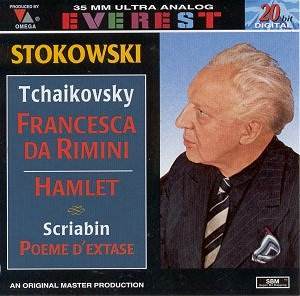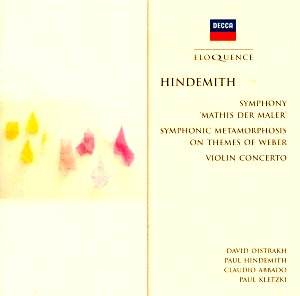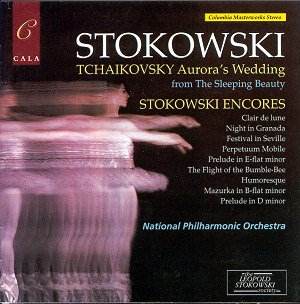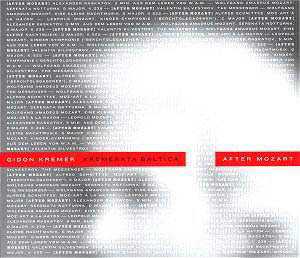 Composer: Pyotr Ilyich Tchaikovsky
Composer: Pyotr Ilyich Tchaikovsky
Works: Francesca da Rimini (1876), Hamlet (1888), Alexander Scriabin: Poème d’Extase (1908)
Performers: Stadium Symphony Orchestra of New York/Leopold Stokowski
Recording: c. 1959, Tchaikovsky: 1959 Manhattan Center, New York, Houston Civic Center, Texas. AAD
Label: Omega Everest EVC 9037
In the pantheon of late Romantic music, Tchaikovsky’s tone poems serve not only as sonic narratives but as profound emotional explorations. “Francesca da Rimini,” with its tragic tale of doomed love and betrayal, and “Hamlet,” steeped in Shakespearean drama, encapsulate the composer’s ability to weave rich psychological landscapes through orchestral color and thematic development. This recording under the baton of Leopold Stokowski, a conductor renowned for his flamboyant style and innovative interpretations, positions these works within a historical context that highlights both Tchaikovsky’s genius and Stokowski’s interpretative flair.
Stokowski’s approach to “Francesca da Rimini” is marked by a visceral intensity that captures the work’s emotional peaks and valleys. The performance, characterized by its exhilarating tempo fluctuations, evokes a sense of impending doom, particularly in the tumultuous orchestral passages that underscore Francesca’s tragic fate. At approximately 6:27, the orchestra erupts in a cataclysm of sound, the strings and brass intertwining in a manner that suggests an infernal tempest. This moment epitomizes Stokowski’s propensity for dramatic contrasts, wherein soft, lyrical passages give way to explosive climaxes, effectively mirroring the narrative’s emotional turmoil. His interpretation of the love theme is particularly notable; it emerges with a lush, almost decadent quality that imbues the music with a sybaritic allure, drawing the listener into the depths of Francesca’s longing.
In “Hamlet,” Stokowski maintains a similarly bold interpretative stance, infusing the score with a sense of urgency and aggression. The orchestral color is strikingly vivid, with Stokowski’s deft use of stereo separation enhancing the dramatic impact. The thunderous brass and rumbling percussion create a sense of foreboding, while the strings deliver anguished motifs that reflect Hamlet’s inner conflict. The recording captures the raw energy of the performance, employing dynamics that range from the whispering delicacy of the woodwinds to the cataclysmic force of the full orchestra, effectively embodying the psychological turmoil inherent in the narrative.
The recording quality itself merits particular attention. Originally captured on 35mm stock, the remastering by Omega has preserved an astonishing clarity and depth of sound, allowing the listener to appreciate the intricate interplay of orchestral timbres. While some slight tape hiss is present, it does little to detract from the overall experience. The engineering shines in its ability to convey a rich acoustic space, with the orchestral forces sounding both robust and transparent. This is in stark contrast to other recordings of the era, such as Kertész’s 1960s interpretations, which may lack this level of sonic fidelity and dynamic range.
The inclusion of Scriabin’s “Poème d’Extase” adds a fascinating layer to this collection. Stokowski’s handling of this work is equally compelling, illuminating its ethereal and ecstatic qualities. The spotlighting of individual instruments creates a kaleidoscopic effect, though it sometimes sacrifices a cohesive orchestral perspective. Nevertheless, this interpretation thrives within Stokowski’s luxurious sound palette, evoking images that are both dreamlike and cinematic, reminiscent of the lush landscapes found in Stravinsky’s “Firebird.”
The performances captured in this recording are not merely historical artifacts; they represent a confluence of Tchaikovsky’s emotive power and Stokowski’s distinctive interpretative vision. Within the broader context of recorded orchestral music, this disc stands as a reference point for both the Tchaikovsky tone poems and the orchestral practices of the mid-20th century. Stokowski’s audacious interpretations breathe new life into these works, making this recording indispensable for anyone interested in the emotional depths and technical brilliance of late Romantic orchestration.



